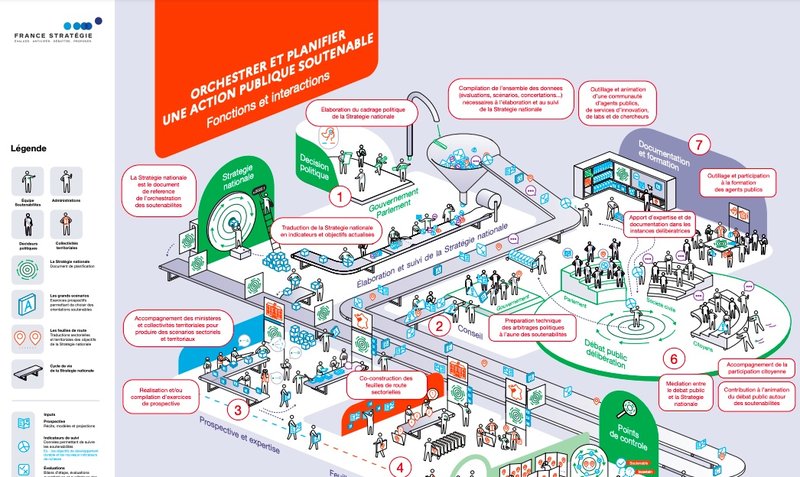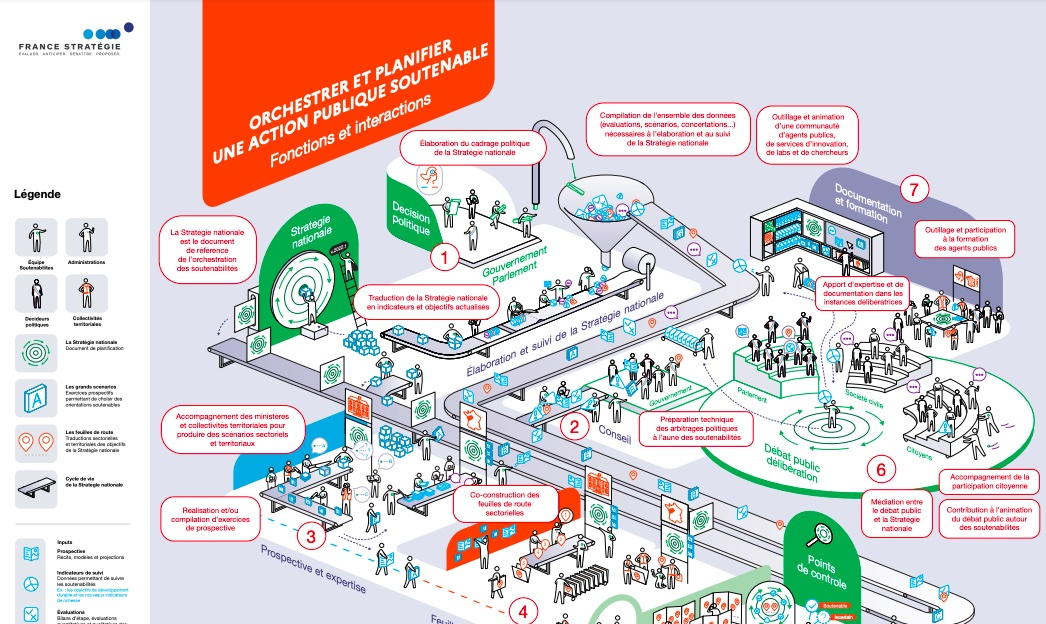"We are going through a triple crisis, ecological, social and democratic. On all of these we are in danger of exceeding the limits of what our societies and our environment can environment can bear. And on all of these levels, our public policies are struggling to provide coherent struggle to provide coherent and sustainable responses. How can we renovate the fabric of public How can we renovate public action in order to meet these cross-cutting challenges? How can we build the frame of reference of sustainable public action, capable of preserving the capacities of future generations without without sacrificing the needs of the present?
In a report published on May 8, 2022, France Stratégie proposes ways to renovate public action and deal with "conflicts of sustainability. This 296-page report is the result of a multidisciplinary approach launched in early 2020 around three rounds of reflection involving thousands of participants.
Growth vs. sobriety: how to get out of what appears more and more clearly as a dead end?
The France Stratégie report opens with the observation that "the alliance between economic growth and social progress (which) now seems to have reached its limits."The two main paths - green growth and sobriety - in the search for progress with content that is more respectful of ecosystems and people are undoubtedly to be explored in concert and articulated."" Despite the importance and reality of "green innovation", it is not realistic to Despite the importance and reality of "green innovation", it is not realistic to rely on a scenario of "absolute decoupling" between absolutely "green" growth and net emissions. "Despite the importance and reality of 'green innovation,' it is not realistic to rely on a scenario of 'absolute decoupling' between absolutely 'green' growth and net greenhouse gas emissions : first, these innovations are uncertain and their industrialization slow. The time it takes for them to betime they are developed and produce their effects, the risk is that greenhouse gases continue to accumulate beyond the-beyond what is sustainable. "Green innovation, including that based on digital developmentinnovation, including those based on the development of digital technology, must itself ensure that it does not generate a demand for an increasing quantity of resources, which is contradictory to the requirements of the environmental transition and respect for planetary limits. respect for planetary limits.Green growth is not'has nothing dematerialized about it
The authors of the report point out that green innovation requires a significant amount of resources, " whichis theopposite of the requirements of the environmental transition and the absolute decoupling of growth from materials. (...) Green growth, which todayiscarried in our "imagination of progress" by digital technology oreco-construction in particular,isnotdematerialized. Indeed, on aglobal scale, a consensus seems to be emerging to estimate the current level of theenvironmental footprint of digital technology at between 3% and 4% of global GHG emissions (and a growth in this footprint of 6% per year) .Rearming the State in terms of expertise to steer ecological and technological transitions
The report devotes a well-documented chapter to the loss of expertise in the State and the need to "rearm" it. "If theState does not rearm itself in terms of skills, ifit doesnot attract the best profiles to meet its new missions, then it will not be in a position to steer complex transformations (which will require both new multidisciplinary knowledge and theagility to innovate) or to think of new ways ofacting, particularly in its collaborations with local authorities."The diversity andscope of the crises and transformations that lie ahead must lead public authorities toquestion the strategic skills that will enablethem toanticipate, prevent and/ormitigate the effects of these crises and transformations, and to manage them.The various movements of decentralization and internal reorganization (in particular through the creation of public administrative establishments) "do not always seem to have been consistent with the ever-increasing number of missions incumbent upon it and the maintenance ofsufficient expertise to steer the ecological and technological transitions .
When outsourcing dries up the state's digital expertise
France Stratégie points to a loss of State skills in the IT and digital sectors, unequally compensated by the growing use of external skills. " While modernization has been partly built on digitization, particularly through the dematerialization of public services, the State has never been able to be autonomous in this area (there are 18,000 public IT specialists, or less than 1% of the State's staff) and has always called on outside consultants to manage its major digital transformation projects. While the specific nature of IT skills (technical and rapidly evolving) may justify partial outsourcing, the Cour des Comptes has nevertheless questioned the economic rationality (or even sustainability) of such outsourcing, given the costs of services and maintenance incurred, compared to their internalization.This observation has led the government to fill 400 IT positions in 2021.
According to France Stratégie, " the question of outsourcing can be coupled with a question of digital sovereignty, when the data used is stored "in data warehouses most often owned by American companies. The same questions, adds France Stratégie, arise at the territorial level, when, for example, the digitization of cities or territories generates masses of data whose management becomes strategic.
Finally, France Stratégie concludes, " mastering these technologies is a necessary condition for achieving a form of digital sobriety for the State. Public organizations can play a major role in managing the environmental dimension of their digital transition... provided that they have the appropriate references and tools.
Define a national sustainability strategy
In order to reform the " factory of public decision-making", France Stratégie proposes the implementation of a national strategy of sustainability: environmental protection, social justice and economic growth. It could take the form of a five-year programming law.The decarbonization imperative would be the foundation (France has not met its greenhouse gas emission reduction targets).

The report emphasizes the need for citizen participation in the development of the strategy in a context of mistrust of public authority.
The implementation of a "deliberative continuum" between the population and the various actors could be organized in several ways:
- or give a "normative competence" to citizens: "permanent chamber of the future", "primary assemblies of citizens", for example;
- or make more frequent use of citizens' conventions, citizens' juries or other existing consultative bodies.
An "orchestration" to manage this strategy
France Stratégie recommends setting up an "orchestration" attached to the Prime Minister, free from purely sectoral interests. The steering mission would be to reconcile environmental, economic and social objectives within the framework of the following functions- the instruction and monitoring of the national strategy;
- advice to the Government and preparation/formalization of arbitrations;
- foresight and expertise ;
- departmental roadmaps and concerted territorial strategies;
- Checkpoints and evaluation throughout implementation;
- Facilitating public debate.
How to build a sustainable digital world?
Throughout the first half of 2021, France Stratégie brought together actors and witnesses to "understand how sustainability issues were integrated - or not - into the design, development, implementation and evaluation of sectoral and cross-cutting public policies".Five "Cahiers des Soutenabilités ", published at the end of November, provide initial answers to these questions, based on numerous and varied field experiences. "These thematic notebooks aim to "open the hood" of the public action factory in order to examine it under the microscope of the concept of sustainability.One of these five Cahiers The first issue, "The future of digital technology in the context of ecological transition and in a social environment where technological and scientific progress is increasingly questioned by citizens", was entitled "How to build a sustainable digital economy".Read more
Références :





